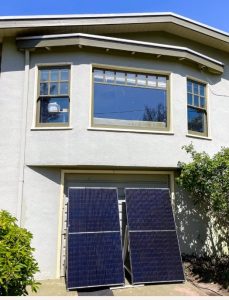A growing number of American households are turning to plug-in solar panels—compact, easy-to-install systems that generate electricity simply by plugging into a wall outlet. The technology, long popular in Europe, is now emerging as a practical and affordable energy option for U.S. homes and apartment dwellers.
According to ABC News and other major outlets, high installation costs for rooftop panels and the recent reduction in federal tax credits are fueling demand for plug-in solar systems. The compact panels, roughly the size of a window, can be installed on balconies or decks and connected directly to home outlets to feed power into the household grid.

In Oakland, Northern California, resident Terrence Dwyer recently purchased a $2,000 system from nonprofit Bright Saver. The setup includes two 400-watt panels, an inverter, a smart meter, and a circuit breaker. Dwyer says it cuts his monthly electricity bill by about $35.
“I installed it for environmental reasons,” he said. “If I had gone with a rooftop system, it would have cost more than $50,000.”
Bright Saver’s new $399 mini model sold out within six days of release. Co-founder Cora Stryker noted that “consumers who wanted solar energy but hesitated due to cost are rushing in now,” describing demand as “explosive.”
Regulatory support is also beginning to grow. In 2025, Utah became the first state to pass a law easing restrictions on small-scale solar systems. The legislation establishes safety standards tied to certification by national testing organizations such as UL (Underwriters Laboratories). With this move, Utah aims to expand access to household plug-in solar markets statewide.
Experts remain divided on the market’s long-term economics. Severin Borenstein, professor at UC Berkeley, said the cost-effectiveness of plug-in solar depends on product type and regional electricity rates.
Still, growing environmental awareness is driving consumer adoption. Craig Keenan, a mechanical engineer from Baltimore, installed the $399 model in July 2025. “I wanted to contribute to reducing greenhouse gas emissions,” he said. “It only took me 15 minutes to install.”
Although still in its early stages, the plug-in solar market could expand quickly as federal incentives shrink and states move to relax regulations. Robert Kurd, a researcher at the UCLA Center for Sustainable Societies, said utilities may resist widespread energy independence, but the trend is irreversible.
“Technology is moving faster than regulation,” he explained. “We’re entering a new era of consumer-driven, decentralized electricity generation.”
BY EUNYOUNG LEE [lee.eunyoung6@koreadaily.com]



